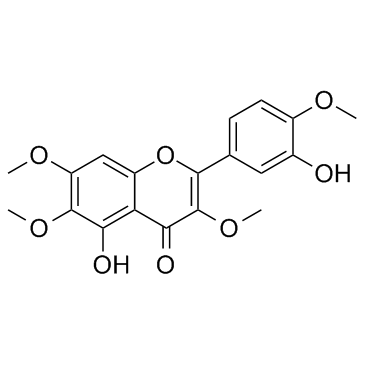Casticin, a flavonoid, potentiates TRAIL-induced apoptosis through modulation of anti-apoptotic proteins and death receptor 5 in colon cancer cells.
San-Yuan Tang, Mei-Zuo Zhong, Guang-Jin Yuan, Su-Ping Hou, Lei-Lan Yin, Hao Jiang, Zheng-Υang Yu
Index: Oncol. Rep. 29(2) , 474-80, (2013)
Full Text: HTML
Abstract
We investigated the effect of casticin on apoptosis induced by tumor necrosis factor (TNF)-related apoptosis-inducing ligand (TRAIL). We found that casticin potentiated TRAIL-induced apoptosis in human colon cancer cells. Casticin downregulated cell survival proteins including Bcl-xL, Bcl-2, survivin, XIAP and cFLIP, and induced death receptor 5 (DR5), but had no effect on DR4 and decoy receptors (DcR1 or DcR2). Deletion of DR5 by siRNA significantly reduced the apoptosis induced by TRAIL and casticin. In addition, casticin induced reactive oxygen species (ROS) generation in a dose-dependent manner. Collectively, the present study showed that casticin potentiates TRAIL-induced apoptosis through downregulation of cell survival proteins and induction of DR5 mediated by ROS.
Related Compounds
| Structure | Name/CAS No. | Molecular Formula | Articles |
|---|---|---|---|
 |
Vitexicarpin
CAS:479-91-4 |
C19H18O8 |
|
Involvement of histone H3 phosphorylation via the activation...
2014-08-01 [Int. J. Oncol. 45(2) , 843-52, (2014)] |
|
Opioidergic mechanisms underlying the actions of Vitex agnus...
2011-01-01 [Biochem. Pharmacol. 81(1) , 170-7, (2011)] |
|
G2-M arrest and antimitotic activity mediated by casticin, a...
2004-05-10 [Cancer Lett. 208(1) , 59-64, (2004)] |
|
Isolation and immunomodulatory properties of a flavonoid, ca...
2009-11-01 [Phytother Res. 23(11) , 1516-20, (2009)] |
|
Casticin, a flavonoid isolated from Vitex rotundifolia, inhi...
2010-12-01 [Acta Pharmacol. Sin. 31(12) , 1564-8, (2010)] |